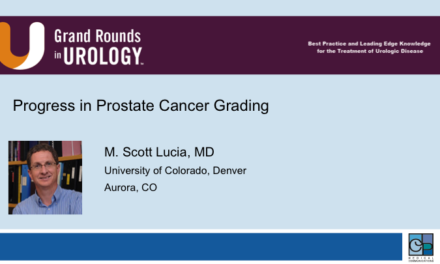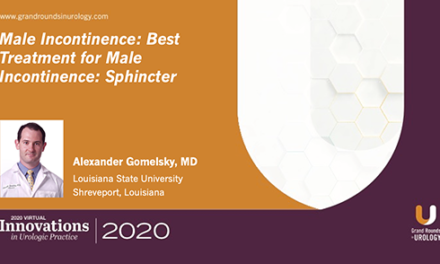Dr. Stacy Loeb spoke at the 16th Future Directions in Urology Symposium on Sunday, August 9, 2015 on “Urology and Social Media.”
Presentation
References: American Urological Association free webinar: www.auanet.org/education/videos-webcasts.cfm
Nason GJ, O’Kelly F, Kelly ME, et al. The emerging use of Twitter by urological journals. BJU Int. 2015 Mar;115(3):486-90. http://www.ncbi.nlm.nih.gov/pubmed/24925047
Keywords: urology, social media, Twitter
How to cite: Loeb, Stacy. “Urology and Social Media” Grand Rounds in Urology. September 2, 2015. Accessed Dec 2024.https://dev.grandroundsinurology.com/general-urology-stacy-loeb-urology-and-social-media
Transcript
Urology and Social Media
Back in 2006 when it started, there were only 23 healthcare professionals on Twitter and literally now there are more than 75,000 generating more than 150,000 tweets per day. This is taking hold and there are many reasons to use social media in urology. Some of them include finding out about news, research, and conferences. There’s a journal club on Twitter, advocacy for causes, networking of course with colleagues. Crowdsourcing if you ever want to pose a question to a bunch on international experts and advertising. I’m going to give you an example of each of these starting with major news.
I actually don’t read the newspaper at all anymore. Twitter is my tailored newspaper because any paper that I would read or anything that I’m interested I follow on Twitter. Instead of just flipping through the New York Times to find out what you want to know about it’s very fast to just scroll through the tweets and they’re limited to 140 characters so it is just a sound bite. I find this much faster. I’m a Syracuse basketball fan so I follow the Syracuse basketball Twitter stuff and instead of looking through the whole sports section I get exactly the team I want to know about coming. I think really it is a great way to find out what’s going on and within the medical world there’s pretty much no instance where there’s a new drug approved or something big happens that I don’t hear about within a few hours.
This is also possible to do to some extent on Facebook but really it’s not a rapidly dynamic as Twitter but nevertheless you can sometimes see when different things are approved or when the FDA issues a warning about something on Facebook.
Emerging research is probably my favorite use of Twitter. All the major medical journals have Twitter feeds so it’s a very condensed way to scroll through. What came out in the New England Journal this week? Oh my gosh. It just so turns out that the CHARTED trial finally came out after a year of waiting. These things all hit Twitter immediately. In fact the embargo lifts the journals put these things on Twitter and then you can see how everybody reacts to it. It’s very interesting to learn about it and to see the reaction and discuss the study. This is what we just discussed this week on the Urology Journal Club on Twitter. If you’re following along with that you can hear what people think about it and if they plan to change their practice.
It is something that’s being taken up more and more by urology journals as well and actually it correlates with the amount of citations and with the impact factor of the journals themselves. It’s no longer something that’s being ignored or on the fringe or for people who follow Kim Kardashian this actually has real scientific impact that’s even being demonstrated in terms of citations and impact factors. It’s even becoming mandatory now. Some of our journals are requiring that you write a tweet about your paper when you submit the paper. I just submitted something to European Urology and you have to write up two tweets that can be published by them on Twitter if you article gets accepted. A lot of the journals are doing this now because the ultimate goal is dissemination. If nobody ever reads about your work or hears about it then it really didn’t do any good so in order for us to have impact with all of the hard work we’re doing it is nice to spread the word and this is a great way. There are tips that are published her, if anyone’s interested, by Grayson on how to construct a good tweet about a scientific paper.
The next major use of Twitter is for conferences. Now all the major urology conferences have their own Twitter feed and in advance they’ll tell you what the hashtag is. I’m not sure if everyone knows that a hashtag is. Maybe it’s disseminated somewhat into the popular lexicon even for people not on Twitter but it’s when you put the pound symbol in front of a word. A pound symbol with EAU15 or AUA15 as long as that’s in there somewhere then you can search for all of the tweets from that particular conference. Hashtag prostate cancer would have all tweets related to prostate cancer.
These conference feeds are really growing. There were more than 9,000 tweets at the AUA last year and it nearly doubled I think this year. This is a great way to keep up with what’s happening at the meeting. There are so many sessions going on. Maybe you missed the meeting. You can definitely see it on Twitter. Here’s a tweet that I wrote this morning actually. Thanking Dr. Crawford for inviting me and that we’re very excited about hashtag FDU15 so I invented a hashtag for this meeting. It’s good to have one and if you’re going to be posting anything you can use it too.
Twitter is also really good for medical education. One example that I already mentioned is this monthly urology journal club but many of the other specialties are taking them up also. There’s one for radiation oncology, et cetera. This is held the first week of every month. It’s a 48-hour asynchronous discussion. We’ve got participants in the U.K., Australia, all over and as long as you use the hashtag EuroJC then you can read everyone’s tweets whenever you happen to sign on. They just pick one article and everybody discusses it every month.
There are also some other educational options available on social media for trainees. For example, some quizzes, like this one is showing transillumination of the scrotum and asking what’s the diagnosis or some imaging findings so the uses in medical education are definitely expanding rapidly also.
This is a project I’ve been very involved in over the past year. We have put all of the EAU guidelines into tweets so we sat there for days taking every EAU guideline and making them into 140 character tweets. I think this is actually a really visionary initiative of the EAU and we’re still working on it. We have some new projects planned doing quizzes of different important points in the guidelines so this is definitely another great place to find out about changes to the guidelines is through Twitter.
Advocacy, this is really a wonderful forum for advocacy because in the past let’s say you were upset about something. If united lost my luggage for example I might call somebody, be on hold forever, probably nothing would happen. But if you tweet at them they will respond to you right away.
I was at a urology conference about a month ago and somebody had no hot water in their hotel room so they tweeted to the Hilton and literally someone was up at their room within minutes and they got like a hundred dollars off their bill. These things are big for PR and if people do not show good customer service they don’t want negative stuff on social media. Whatever it is that you want to advocate for, whether it’s some issue you’re having or something like legislation, this is discussing U.S. Preventive Services Task Force reform, which is probably something a lot of us feel strongly about. What are you going to do? Write to your congressman? You can also have a big Twitter campaign and these people often will write back on Twitter, which is amazing.
Networking, it’s really been a fun way to meet a lot of interesting people. Even Laura and I became friendly through Twitter really. I think it’s nice for people who are in different geographical areas perhaps slightly different specialties to become friends. There’s everyone from medical students to trainees to urology chairs, industry, you name it. It is a level playing field where everyone can have an open conversation. If you’re going to meetings or other events it’s a nice way to spread the word about networking activities.
Crowdsourcing this is nice for clinicians. Of course, you don’t want to use any patient identifiers. You don’t say Mr. Jones a 58-year-old man. But if you have a general question like is BRCA related to prostate cancer you will likely get answers back from at least ten other urologists all over the world within an hour.
It used to be if I had a question I’d figure out which of my mentors I’m going to call up on the phone and maybe they’d be available. You don’t even need to phone a friend anymore. You can crowdsource to the world of urologists.
Advertising, why not use social media. It’s a huge platform to disseminate information about whatever you want to advertise. If it’s your clinical practice, a course you’re doing, you’re going to be on TV, whatever it is that you’re doing again, there’s no point of doing it in the closet with nobody knowing about it. You want to tell people because the people that follow you choose to follow you. You’re not telling people stuff that they’re not interested in. These are people who also are interested in prostate cancer if you are tweeting about prostate cancer so if you’re doing something related to that or there’s a course this is exactly the target audience.
I host the men’s health show on SiriusXM so on Wednesday nights when I have my show I write that the lineup is going to be and that way if someone wants to listen to me they know what we’re talking about and what time. It’s a good way to promote what you’re doing and hopefully interested parties get the information. This is with Dr. Concepcion right here. His course next week in Los Angeles is about prostate cancer and the AUA has been tweeting about it. It’s a good way to find out about things like course offerings, conferences. You always want to include links. You’ll notice these all have links. If you’re going to promote something you want to tell people where to go; they shouldn’t have to work for it. If you have a new article that you’re talking about include a link to the article so that people can actually read it if the sound bite is interesting. A really targeted place for advertising.
Some people express concerns about social media use. This was a survey that we sent to AUA members and about 71% had a social media account but some of the people that didn’t thought maybe there’s no added value or expressed concerns about privacy. We did a little survey to address is there added value? Are the people using it thinking that it’s actually improving either their clinical or academic practice.
We sent a survey to all of the people that use Twitter at the EAU and the AUA in 2014. Of the respondents you can see very high percentages felt that it was useful to them for networking, disseminating information, research, advocacy, and career development. Only 38% for physician/patient communication but for all the other items that we asked more than 50% found it useful. Obviously this is a highly selected and biased sample because these are the people that use Twitter at a conference. The point of this was to find out do the people using it think that it actually enhances things and they do. That was good news.
There are some codes of conduct available that I think are worth being familiar with before undertaking this activity. The AUA code of conduct of course you always want to be very professional, not using swear words or ideally not posting photos with alcohol in them which can actually be really difficult at urology meetings so when I’m taking the picture I say okay everyone put your beer down because we’re not supposed to technically have it in the picture.
Protecting confidentiality is number one. This is the kind of stuff that people get fired over is if you take a picture that has a patient in it or you say something that breaks HIPAA so that’s what you never want to do. I’m not sure I would even recommend taking pictures in the hospital. At conferences and other public events it’s totally fair game unless you signed an agreement at an ad board or something like that. Being courteous. I have seen some pretty negative interactions on social media and I think it’s very important as professionals that we act how we would want to be treated. You don’t know who’s out there and whose going to read this so just have discretion, support the identity of our profession, and be thoughtful.
BJUI has similar types of social media guidelines and it’s always important that you consider that this content can be around forever. Even if you post something and you delete someone may have taken a screenshot. These things disseminate pretty quickly. Sometimes I’ve taken a screenshot when I see something that I think is really crazy so just think before you tweet just like you would think before you say something.
For the physicians many hospitals are fine with you having your own Twitter account. You’re just supposed to state on there that your views are your own and that may be the case for industry also. If it is your personal Twitter feed that you’re not representing the official position of your company.
EAU is the other urology organization with social media recommendations. All three of these are online and available and very useful before you start using. In fact, the EAU specifically recommends that you should consider understanding better how these work before you actively engage. There are quite a few people who just are passive users of Twitter where they follow the people that they want to and they use it as a newspaper but they don’t write back or interact.
I think it is actually great to be an active user but it’s a nice way to start as a passive user to get an idea how it works before you start engaging.
They say treat it like the hospital elevator. Just like you wouldn’t talk about Mr. Jones and his situation in the hospital elevator in front of people. They again mention saying that the views are your own, being open and honest, assume it’s permanent, and maintain limits.
In summary social media I think, is extremely useful for finding out about news, about research updates, participating during conferences whether you’re there or you’re not. That’s how I got started. I was giving a lecture on prostate biopsy complications in Australia and at the end of my talk in the questions and answer session they told me we got a question on Twitter from a guy in Canada and he’s wondering which antibiotics are you using now for prophylaxis. I thought how the heck does someone in Canada know what I’m talking about in Australia. They literally took my answer and tweeted it back to the guy in Canada so I thought maybe there is something to this because I was in the group who thought it was all about Kim Kardashian before and I realized it really does add value.
I think of the social media Twitter is the most useful of all the platforms at least in the professional context of urology but it’s useful to review all of the professional guidelines for social media first.
If you want more information about this a nice summary is on the Urology Match website and there’s a webinar, Dr. Andriole checked my webinar which was nice from the AUA and they’ve now posted it on the website for free.
In conclusion I would say that Twitter has taken urology by storm and is here to stay. There is just a ton that you can do with it so get in on the action now or get left behind. The next time you can press this button and I will see you on Twitter.
ABOUT THE AUTHOR
Dr. Stacy Loeb is a Professor of Urology and Population Health at NYU Langone Health specializing in prostate cancer. Dr. Loeb completed her urology residency training at Johns Hopkins in Baltimore, Maryland, and subsequently received a Masters of Science in Comparative Effectiveness Research at NYU. She has a K07 grant from the National Cancer Institute to study active surveillance for prostate cancer. Her research is also supported by the Blank Family Foundation and Louis Feil Charitable Lead Trust. Dr. Loeb is an internationally recognized expert in prostate cancer with more than 285 peer-reviewed published articles and 11 book chapters. She is on the Editorial Board for the Journal of Clinical Oncology, the British Journal of Urology International, European Urology, Urology Practice, Urology Times, Nature Reviews Urology, and Reviews in Urology. Dr Loeb authored the chapter on “Diagnosis and Staging of Prostate Cancer” for Campbell-Walsh Urology, the primary textbook used in the field of urology. She also frequently gives international lectures on prostate cancer, and hosts the Men’s Health Show on Sirius XM 81 satellite radio.





